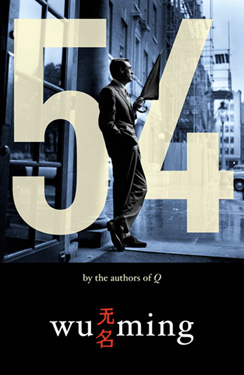'There is all a best-selling novel is about:
Impossible love stories, enduring friendship, tangled family
relationships... Only, unlike what happens in the typical
North-American flick, this time the good are the "bad", i.e. the poor,
the oppressed, the idealists.'
(
El Pais, Spain)
>
54 plays with the forms of
espionage novel, the noir genre, and social realism. It seeks to
transcend those forms, and it does: this is mutant fiction, a living
narrative organism composed of various bodies that aim at multiple
endpoints. The most accomplished: a spy story on the surface, with an
eye on the ordinary citizen, who acts as witness or protagonist of
history. This happens at a level where myths - the archetypical hero,
but it goes beyond that - are described as doubtful and ambiguous
constructions. It makes sense then that Cary Grant reads
Casino
Royale (the first James Bond novel) with perplexity and
amazement, before he meets Marshall Tito and ends up talking with him
about the personality cult.'
(
Qué Pasa, Chile)
'54...is a sprawling epic... The plot is a formidable feat of
imagination that moves restlessly between Bologna, Naples, California,
Moscow, Dubrovnik and Marseilles... Daring... A more accomplished piece
of work [than Q]... 54's scope is no less ambitious, but has a
refreshing lightness of touch. The portrait of a world-weary Cary
Grant...is utterly convincing.'
(
The Times, UK)
'This new work amply confirms their talent... Utterly convincing. What
emerges is an epic about identity and celebrity, communism and
corruption... A stupendous, charming, provocative and profound novel.
It makes most modern books seem paltry in comparison.'
(
Scotland on Sunday)
'Centred around beautifully written human relationships, Wu Ming
explore European and American politics and history, weaving distinct
narratives (separated by time, place, and characters) together as Don
DeLillo did in Underworld. It's an exciting read, not only due to the
language and various writing styles but also because of the powerful -
and often conflicting - ideas that it contains... It seems like each
member of the Wu Ming has been driven on by their peers to take risks
and produce their best and most challenging work.' (
Clash
Magazine, UK)
'
54 is a great, sprawling epic. Serious and
satirical, it can be read as a spy novel, gangster thriller and
political manifesto, with enough scenes of unsavory characters, drug
smuggling, shoot-outs, and doomed love affairs to resemble a Romanzo
della Polpa (pulp fiction). But this would be a shallow
reading - 54 is much more complicated, and simple.
At its heart it is a story of the hopes and expectations we have for
ourselves and each other, and how the forces of history, life and love
can dash and rebuild these.'
(
The Philadelphia Inquirer)
'Basically, they’re trying to write
V,
The Odyssey,
Casino Royale,
Underworld,
Pereira Declares and
The Godfather all at once. And have fun with all of them.'
(
Bjorn from Stockholm, reviewing
54 on World Literature Forum)
'I’m gonna get this description tattooed on my butt!'
(
Wu Ming 2 from Bologna, commenting on the quote above)
 A Class Apart, that is: A Hundred Years of
Cary Grant
A Class Apart, that is: A Hundred Years of
Cary Grant
 Cary
Grant: Style as a Martial Art. A conversation with Wu Ming 1
Cary
Grant: Style as a Martial Art. A conversation with Wu Ming 1
 Reviews of 54
Reviews of 54
 The
Wikipedia entry for 54
The
Wikipedia entry for 54
 54 on
David Dodge's website
David Dodge (1910-1974) was
the author of the novel To Catch a Thief on which
Hitchcock's film was based.
54 on
David Dodge's website
David Dodge (1910-1974) was
the author of the novel To Catch a Thief on which
Hitchcock's film was based.

SHAUN WHITESIDE (a Wu Ming 6 Honoris
Causa)
Born in County
Tyrone, Northern Ireland, in 1959. Shaun Whiteside has
translated many books from French, German,
Italian and Dutch, including works by Freud and Nietzsche, Michèle
Desbordes, Amélie Nothomb and Giorgio Pressburger. His translation of Magdalene
the Sinner by Lilian Faschinger won the Schlegel-Tieck
Prize in 1997. His translation of our novel Q
was a finalist for the Independent Foreign
Fiction Prize in 2003. 'Superb' is the more common adjective used by
reviewers to describe his translation work.
|
 Wu Ming's Official Website,
in the section where
Wu Ming's Official Website,
in the section where  our books are described,
this is the page dedicated to our novel 54.
our books are described,
this is the page dedicated to our novel 54.  Except where stated
otherwise, the content of this website is licensed under a Creative
Common License. You are free to copy, distribute, display, and perform
the work. You are also free to make derivative works, under the
following commandments: thou shalt give the original author credit;
thou shalt not use this work for commercial purposes; If thou alter,
transform, or build upon a text, thou shalt distribute the resulting
work only under a license identical to this one.
Except where stated
otherwise, the content of this website is licensed under a Creative
Common License. You are free to copy, distribute, display, and perform
the work. You are also free to make derivative works, under the
following commandments: thou shalt give the original author credit;
thou shalt not use this work for commercial purposes; If thou alter,
transform, or build upon a text, thou shalt distribute the resulting
work only under a license identical to this one. 





